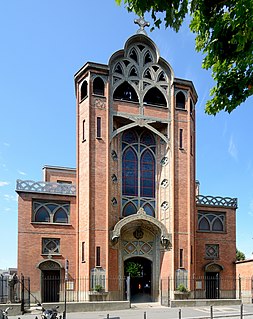
Michel de Nostredame, usually Latinised as Nostradamus, was a French astrologer, physician and reputed seer, who is best known for his book Les Prophéties, a collection of 942 poetic quatrains allegedly predicting future events. The book was first published in 1555.

Pierre Curie was a French physicist, a pioneer in crystallography, magnetism, piezoelectricity, and radioactivity. In 1903, he received the Nobel Prize in Physics with his wife, Marie Curie, and Henri Becquerel, "in recognition of the extraordinary services they have rendered by their joint researches on the radiation phenomena discovered by Professor Henri Becquerel".

Brillat-Savarin is a soft-ripened triple cream cow's milk cheese with at least 72% fat in dry matter. It has a natural, bloomy rind. It was created c. 1890 as "Excelsior" or "Délice des gourmets" by the Dubuc family, near Forges-les-Eaux (Seine-Maritime). Cheese-maker Henri Androuët renamed it in the 1930s, as an homage to 18th-century French gourmet and political figure Jean Anthelme Brillat-Savarin.

War and Peace is a novel by the Russian author Leo Tolstoy, first published serially, then published in its entirety in 1869. It is regarded as one of Tolstoy's finest literary achievements and remains an internationally praised classic of world literature.

Pierre-Joseph Cambon was a French statesman. He is perhaps best known for speaking up against Maximilien Robespierre at the National Convention, sparking the end of Robespierre's reign.

Bibliography, as a discipline, is traditionally the academic study of books as physical, cultural objects; in this sense, it is also known as bibliology. English author and bibliographer John Carter describes bibliography as a word having two senses, one, a list of books for further study or of works consulted by an author ; the other, one applicable for collectors, is "the study of books as physical objects" and "the systematic description of books as objects".

Pierre Gassendi was a French philosopher, Catholic priest, astronomer, and mathematician. While he held a church position in south-east France, he also spent much time in Paris, where he was a leader of a group of free-thinking intellectuals. He was also an active observational scientist, publishing the first data on the transit of Mercury in 1631. The lunar crater Gassendi is named after him.

The Bibliothèque nationale de France is the national library of France, located in Paris. It is the national repository of all that is published in France and also holds extensive historical collections.

A Black Mass is a ceremony typically celebrated by various satanic groups. It has existed for centuries in different forms and is directly based on a Catholic Mass.

Camisards were Huguenots of the rugged and isolated Cévennes region and the Vaunage in southern France. In the early 1700s, they raised a resistance against the persecutions which followed Louis XIV's Revocation of the Edict of Nantes, making Protestantism illegal. The Camisards operated throughout the mainly Protestant Cévennes region including the Vaunage and the parts of the Camargue around Aigues Mortes. The revolt broke out in 1702, with the worst of the fighting continuing until 1704, then skirmishes until 1710 and a final peace by 1715. The Edict of Tolerance was not finally signed until 1787.
The year 1736 in science and technology involved some significant events.
The year 1658 in science and technology involved some significant events.

René-Jean-Marie-Joseph Guénon, also known as Abd al-Wahid Yahya, was a French author and intellectual who remains an influential figure in the domain of metaphysics having written on topics ranging from "sacred science", to symbolism and initiation.

Pierre François Xavier de Charlevoix, S.J. was a French Jesuit priest, traveller, and historian, often considered the first historian of New France. He had little interest for "a life of suffering and deprivation for the conversion of Indian souls", but "an eager curiosity concerning life".

Saint-Jean de Montmartre is a Roman Catholic parish church located at 19 Rue des Abbesses in the 18th arrondissement of Paris.

A musical instrument of the chordophone family, the lyre-guitar was a type of guitar shaped like a lyre. It had six single courses and was tuned like the modern classical guitar, with a fretboard located between two curved arms recalling the shape of the ancient Greek lyre.

Informalism or Art Informel is a pictorial movement from the 1943–1950s, that includes all the abstract and gestural tendencies that developed in France and the rest of Europe during the World War II, similar to American abstract expressionism started 1946. Several distinguishing trends are identified within the movement such as lyrical abstraction, matter painting, New Paris School, tachisme and art brut. The French art critic Michel Tapié coined the term "art autre" in the homonymous book published in 1952 in relation to non-geometric abstract art.

Scientific socialism is a term coined in 1840 by Pierre-Joseph Proudhon in his book What is Property? to mean a society ruled by a scientific government, i.e. one whose sovereignty rests upon reason, rather than sheer will:
Thus, in a given society, the authority of man over man is inversely proportional to the stage of intellectual development which that society has reached; and the probable duration of that authority can be calculated from the more or less general desire for a true government, — that is, for a scientific government. And just as the right of force and the right of artifice retreat before the steady advance of justice, and must finally be extinguished in equality, so the sovereignty of the will yields to the sovereignty of the reason, and must at last be lost in scientific socialism.
Jacques Labessie de Solleysel (1617–1680) was a French author of books on horsemanship. In 1664 he published Le Parfait Maréschal, "for more than 100 years the authoritative work on horses".

The Château de Saint-Michel-de-Maurienne is a 13th century castle in the commune of Saint-Michel-de-Maurienne Savoie département of France.
















